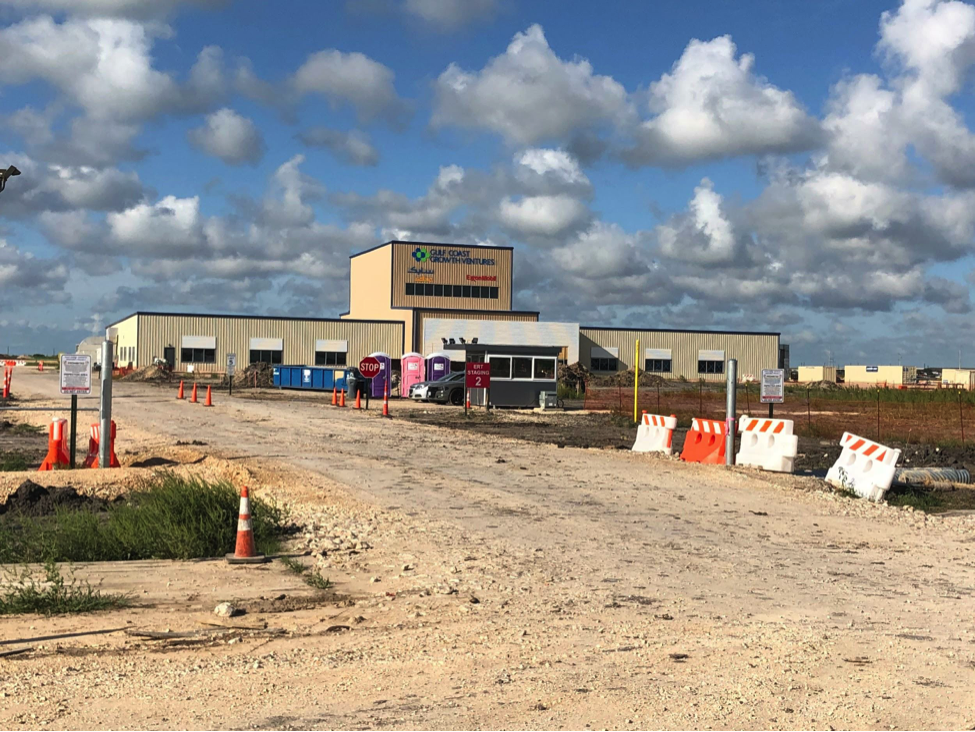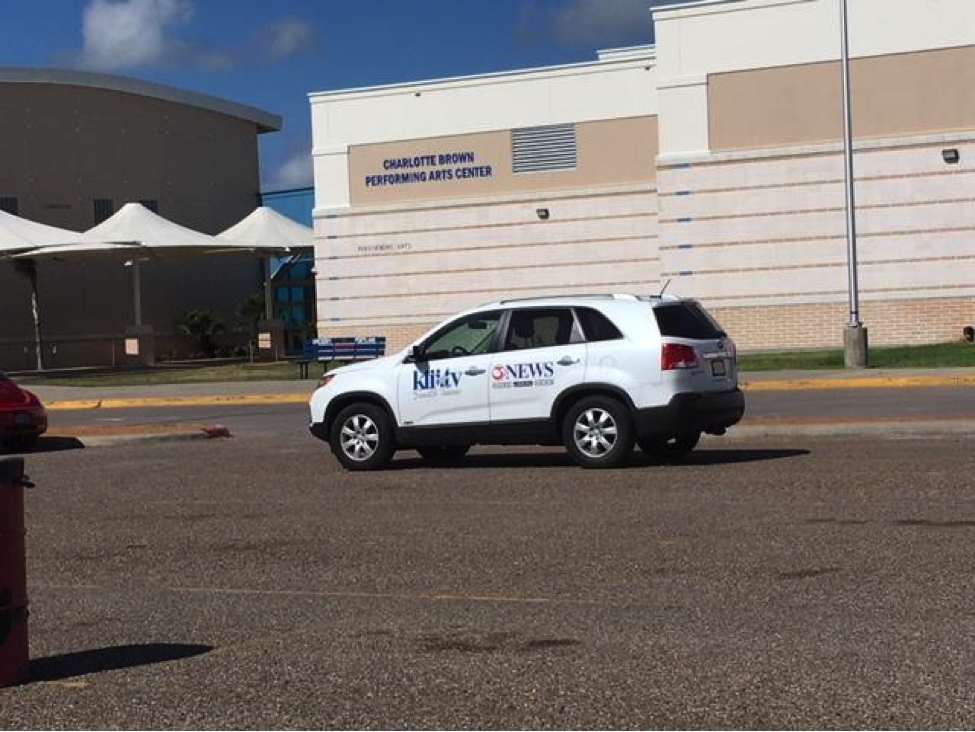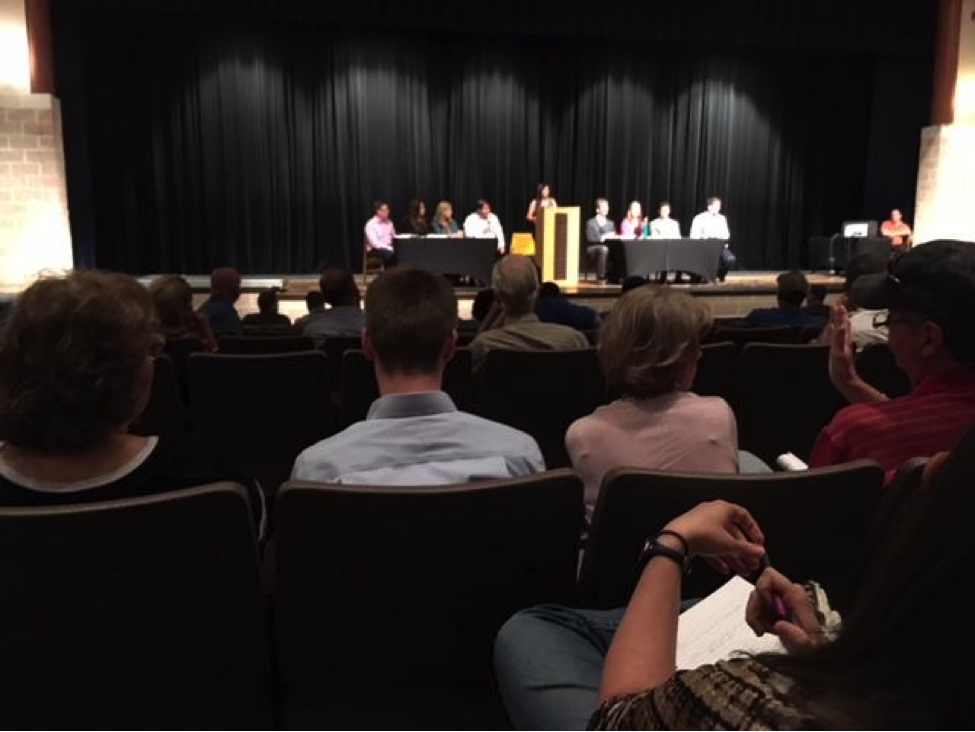Just north of Corpus Christi, at the edge of the small city of Gregory, which is literally down the street from Portland along State Highway 181 sits an empty field full of flowers.
(Approximate location)
Okay, it’s “empty” except for a three-story building with a sign that says GCGV (Gulf Coast Growth Ventures) and a bunch of trucks and construction equipment. The office/training building would -- if Exxon gets its way -- sit in front of the largest ethane cracking facility in the world. And right behind the facility would be a trucking facility that would take some of the petrochemical products to a marine terminal just east of Portland that then would ship said products around the world, while a railway facility would take other plastic pellet products to the West Coast.
GCGV Training Facility, Gregory, Texas Photo courtesy of Bryan Parras
Who Is GCGV & What Are They Doing?
GCGV is a joint venture between that little company called ExxonMobil and a Saudi Arabian company called SABIC. Exxon and SABIC want to build a massive petrochemical facility featuring what could be the world’s largest ethane steam cracker, two polyethylene (plastics) units, and a monoethylene glycol (antifreeze) unit. The proposed 1,400-acre site on Wildcat Drive is approximately one mile from Gregory-Portland High School and Gregory-Portland Junior High School, and directly across from a new low-income multi-family housing complex.
The Glades of Gregory, near proposed ethane cracker. Photo courtesy of Bryan Parras
Gregory-Portland High School. Photo Courtesy of Cyrus Reed
The logic of why Exxon wants to locate on the Texas coast is pretty simple, even if the industrial process is complex. The giant petrochemical/plastic complex would consist of a steam cracking plant (an ethylene or olefins plant using cracked ethane), which would feed into a monoethylene (MEG) plant and two polyethylene (PE) plants, as well as associated boilers, a wastewater treatment plant and truck and railcar loading racks for the transfer of the products. Some three miles to the east would sit the marine terminal that would export the MEG and other products, even as the rail cars would ship other products west.
If you’re unfamiliar with all those long words, you’re not alone. Basically, Exxon and SABIC want to export plastic products -- like those plastic pellets used in transporting goods -- to the world, courtesy of fracked gas from West and South Texas.
Local Opposition Grows
While the plant has support from some economic development types -- a few county commissioners, chambers of commerce, and local economic development councils -- a recent public meeting revealed that many citizens and local organizations, including the Coastal Bend Sierra Club, are vociferously opposed. They are opposed to the proposed facility and a proposed air permit drafted by the Texas Commission on Environmental Quality, which allows dangerous amounts of toxic and criteria air pollutants into the local airshed. In addition, local residents oppose the large amount of greenhouse gas pollution that will be released if this facility is built and put into operation. They oppose a proposed wastewater permit which will allow toxic waters that also may be too warm to flow into the nearby Corpus Christi Bay, and industrial process and equipment runoff would flow into Copano Bay -- potentially impacting the local whooping crane population. Finally, they oppose both locations where the rail cars will load plastic pellets and the marine terminal with its chemical products storage facility. The marine terminal and rail cars could lead to increased emissions and wind-blown plastic trash mucking up the bays, estuaries, and Gulf, and endangering aquatic and avian species. This is, afterall, in the area of the Aransas National Wildlife Refuge, Port Aransas and Mustang Island State Park and Matagorda Island.
The proposed rail car loading facility, marine terminal, industrial process and equipment runoff and wastewater discharge permit could impact several avian species, including the local endangered whooping crane population.

The proposed marine terminal and wastewater discharge permit could impact the local endangered whooping crane population.
Latest Action
At a recent public hearing for the proposed air permits, dozens of local residents spoke of their love for the Gulf region, and the permanent changes that could occur to them and their families if the draft permits are granted by the TCEQ.
A few examples from the hearing include a local grandfather who noted that the location would just be the wrong place -- between two cities and right down the road from a high school. Other locals, who take their kids to school near the proposed site expressed concern, so did outdoor enthusiasts who bemoaned the fate of not only the local community but the nearby bays and estuaries, questioning the future of the beaches and bays in nearby Fulton if this facility is built. The message was loud and clear at the hearing: residents urged the TCEQ to deny the permit.
Fortunately, Sierra Club’s own Bryan Parras was there at the Gregory-Portland High School Auditorium to record the whole thing if you want to take a look. Many mentioned they are Sierra Club members, and many mentioned that it took Sierra Club to go after Exxon’s Baytown refinery to force enforcement of Clean Air Act rules.
Quite simply, the people of Portland and Gregory have reason not to trust Exxon and the TCEQ to do the right thing.
Exxon Officials spout their plans to build what could be the largest “cracker” facility in the world at a public hearing in Gregory, Texas. Photo courtesy of Bryan Parras
Local community members listen to Exxon and TCEQ officials discuss proposed air permits. Photo by Cyrus Reed
The Sierra Club will be submitting extensive technical comments by the deadline this week and then considering whether to do what we feel like we are often forced to do -- officially contest a dangerous “air permit” through the Contested Case Hearing process once the TCEQ issues its Response to Comments. Stay tuned as the Sierra Club -- and the citizens of our beloved Gulf Coast -- engage in our public process to turn back this dangerous proposal.





